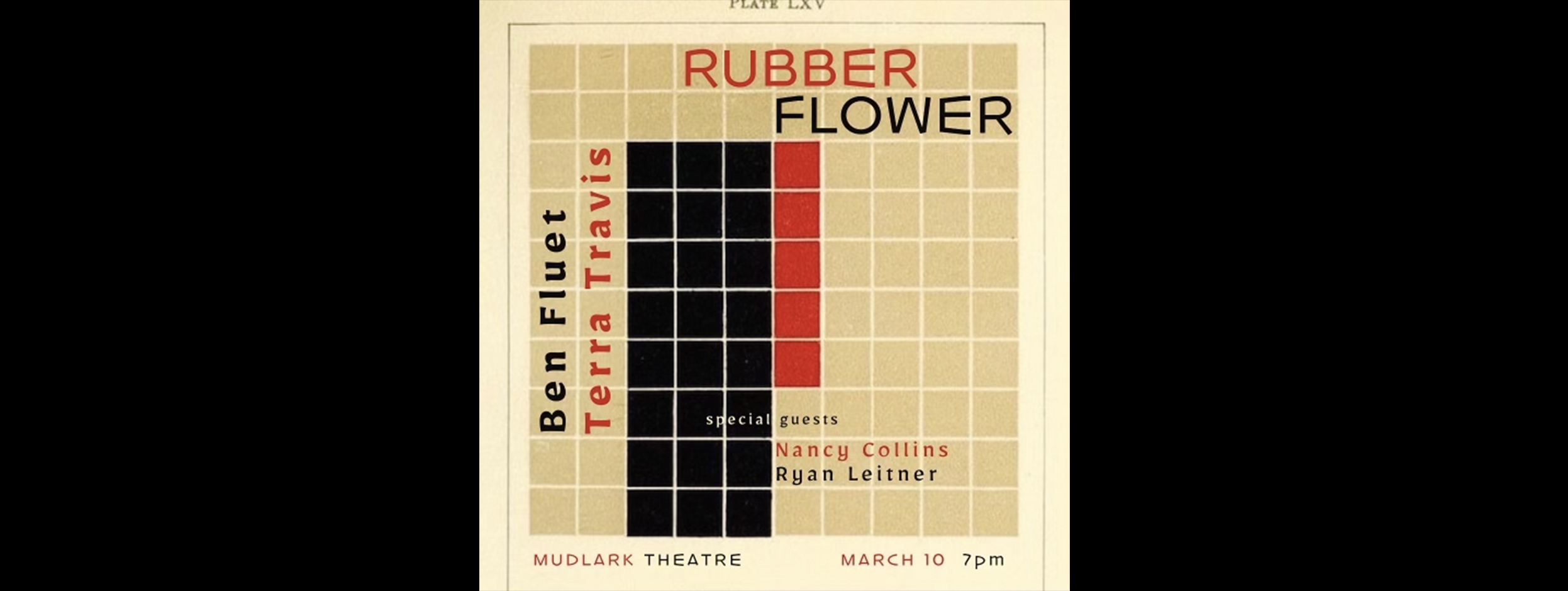Letters Read is an ongoing series in which local performers interpret letters and written documents about culturally vital individuals from various times and Louisiana communities, focusing on New Orleans. Now in its tenth consecutive season, performances are free and open to the general public. LISTEN HERE to recorded events.
2026 THE 10TH
ANNIVERSARY SEASON:
In this cycle, Letters Read presents a collage of outtakes, favorite moments, themes current and past.
Programming begins with INCUBATOR XIX: NOW, National Organization for Women, and how one became a reproductive rights activist in 1989. LISTEN HERE.
Stay tuned for more anniversary Letters Read programming about human, civil, and gender-based rights in this tenth consecutive year year.
PAST SEASONS HIGHLIGHTS:
VISION, VOICE & VALOR
Remembering the Legacy of Terri Bartlett
October 23, 2025
Catapult, New Orleans
Lisa Shattuck & Dylan Hunter.
A staged reading about the founding of Planned Parenthood New Orleans and a production of Letters Read.
In 1984, Terri Bartlett moved to New Orleans to found Planned Parenthood Louisiana. For more than a decade thereafter, Bartlett fought tirelessly for reproductive rights and human dignity in this state.
This performance endeavors to serve as an inspiring model for grassroots and political activism, justice, and equal rights for all.
And, watch this brief story about the event on New Orleans NPR with Dave Walker and The Museum Goer.
2024 HIGHLIGHTS:
FAMILY. CHOSEN AND BLOOD
In this cycle, letters and documents are read from two very different kinds of families: families we are born into and those we choose.
The first subject belongs to the first category, Josephine Louise Newcomb. Her’s is a family saga that turns venal. The second is the latter category comprising four case studies from the early days of the HIV | AIDS crisis in the late 20th century. These stories are presented in quick, incubator-style, experimental podcasts.
 LETTERS FROM THE 1980S HIV/AIDS EPIDEMIC.
LETTERS FROM THE 1980S HIV/AIDS EPIDEMIC.
In partnership with the LGBT+ Archives Project of Louisiana, Letters Read is producing four, incubator-style, mini-podcasts on early HIV/AIDS awareness and activism in New Orleans, Louisiana, and the country at large. Each launches on the dates that follow and remains available thereafter.
INTRODUCTION available HERE.
June 6 Mark Gonzalez, protest, and ACT UP. LISTEN HERE.
Aug 8 Noel Twilbeck and Crescent Care, LISTEN HERE.
Oct 18 Brad Ott, Activism & Underground Publishing, LISTEN HERE.
Dec 5 Pierre Rene “Peter” DeLancey, LISTEN HERE.
Dec 11 AIDS Hospice and Hywel Sims, LISTEN HERE.

THE LETTERS OF JOSEPHINE LOUISE NEWCOMB
October 29
Sophie Newcomb Institute
Tulane University
Nick Slie, Lisa Shattuck, Shadow Angelina Starkey, & Robert Valley.
A second live reading from the archives of Josephine Louise Newcomb. Listen to a recording of it HERE.
H. Sophie Newcomb Memorial College was established by Josephine Louise Le Monnier Newcomb (“Jo”) as she was called, 1816 to 1901) as a memorial to her daughter Sophie who died at the age of 15. At a time when women were discouraged from education, an institution devoted to higher learning for women was a revolutionary idea.
Ladies of Mrs. Newcomb’s privileged class were instead taught to have “accomplishments”. Such as parlor entertainments like piano playing and polite conversation. For the lower classes—who had to hire themselves out as domestic help to survive—cooking, cleaning, sewing, nursing, and caregiving for other people’s families were their lot. For them, education, such as it were, was learned scrubbing pots on the job.
Until its post-Katrina consolidation into Tulane University, Newcomb College was a separate, four-year, baccalaureate-giving institution. Entirely – for – women.
Through Josephine Louise Newcomb’s letters, this reading tells that tale. It was created in grateful partnership with Susan Tucker and Beth Willinger. In great part, this presentation relies on their scholarship, insights, and their project of the same name, The Letters of Josephine Louise Newcomb.
THE LETTERS OF JOSEPHINE LOUISE NEWCOMB
April 13
Catapult, New Orleans
Chris Kamenstein, Shadow Angelina Starkey, & Robert Valley
A podcast of the performance is available HERE.
Special thanks, too, to writer/researcher, Jarret Lofstead and audio engineer Steve Gilliland.

Letters of Josephine Louise Newcomb
A Preview Reading
March 10, The Mudlark Theatre
1200 Port Street, New Orleans.
The evening begins with micro treats by the producer of Letters Read, Nancy Sharon Collins, and visual artist Ryan Leitner. It then features poet Ben Fluet and fictionist Terra Travis.
Letters Read takes this opportunity to introduce the Josephine Louise Newcomb saga to be performed over the 2024 season.
———————————————–
2023 SEASON: NEW YORK/NEW ORLEANS
INCUBATOR XI.
WATER & SALT
Two Cities’ Dilemmas.
 Henniker, Frederick. Notes, During a Visit to Egypt, Nubia, the Oasis, Mount Sinai, and Jerusalem. London: John Murray, 1823. Shown above is an aquatint fold-out view of Jerusalem “whose precision could let a traveler use it for wayfinding.” —https://www.drawingpalestine.com/jerusalem.html.
Henniker, Frederick. Notes, During a Visit to Egypt, Nubia, the Oasis, Mount Sinai, and Jerusalem. London: John Murray, 1823. Shown above is an aquatint fold-out view of Jerusalem “whose precision could let a traveler use it for wayfinding.” —https://www.drawingpalestine.com/jerusalem.html.
This production was created from material collected during the creation of Drugs, Sex, Rock & Roll: A Year of Magic and Wonder. Which coincided with the project’s director/writer’s move back from New York to New Orleans. Quoting from the script, Collins’s observation was that moving home was “kind of like sleeping with an old lover.”
Meanwhile, significant municipal water issues collided in both cities and, in the Middle East. LISTEN HERE.
DRUGS, SEX, ROCK & ROLL
A year of magic and wonder.

LISTEN to an oft-experienced tale of the Big Easy luring an innocent, out-of-towner, to the dark side.
This specific story, ca. 1985, focuses on one, one incredibly transformative year. For one man. Emblematic of many attracted to New Orleans for its louche way of life.
This potentially tragic tale resolves itself into a beautiful, tie-dye butterfly. In which a Tulane undergraduate magically emerges going on to a fulfilling queer life and hugely successful, big city, New York City career.
Geoff Munsterman reads as the subject. Named James, just James. Shadow Angelina Starkey reads as Nancy Sharon Collins, the project director. Historic context has been corroborated by consultant, Royd Anderson. Munsterman and Starkey produced it.
You can access the podcast HERE.
ROBERT MOSES AND NEW ORLEANS’S RIVERFRONT EXPRESSWAY.

July 16
Listen to the podcast HERE.
Continuing our New York/New Orleans journey, we bring you the only project Robert Moses ever did in the Crescent City. With his usual team of engineers and urbanists, he directed a report with suggestions to solve traffic congestion in the Big Easy. Locally, this project—or part of it—is referred to as the Riverfront Expressway.
Robert Moses, the greatest builder New York has ever known, is so often credited with it that it is almost funny that it did not even happen. As frequently as he is credited with the project that never was, he is also incorrectly blamed for the Claiborne Expressway. That, horrendously, did.
This podcast is part of the ongoing script development for a fully realized live performance later this year about Moses, his portion of the report, and the historic outcomes.
The reading is based on primary source research in The Robert Moses Collection at the New York Public Library and Moses’ 1946 “Arterial Plan of New Orleans” commissioned by the state of Louisiana. Additional information comes from newspaper articles, past and current, hearsay, Facebook, Robert Caro’s The Power Broker, Richard Baumbach and William Borah’s The Second Battle of New Orleans, and Hilary Ballon’s Robert Moses and the Modern City.
For information on the current fight to remove the Claiborne Overpass and links to other resources used for this production, go to HERE.
Preliminary reading of
NEW ORLEANS & ROBERT MOSES
April 30
Orange Couch
2339 Royal St.
New Orleans
Free and open to the public and covered by Stefanie Russell on Historia. This is the first live event since October 26, 2019. An informal reading excerpted from the full Robert Moses script being produced for the live event later this year. Here is what it’s all about:
Robert Moses, New York City, and the state’s greatest builder. Respected and reviled. In 1945, Moses was contracted by the state of Louisiana to evaluate, and recommend, remedies for common, mid-20th-century problems such as traffic congestion.
While many of his plan’s ideas were implemented over time, the Riverfront Expressway never materialized.
Excerpts are from Robert Moses’s own writings, letters, and other contemporaneous articles. Primary source material from the New Orleans Public Library, the Historic New Orleans Collection’s Williams Research Center, and Robert Moses papers. Manuscripts and Archives Division. The New York Public Library. Astor, Lenox, and Tilden Foundations.
Amidst the post-World War II automobile-based transportation frenzy, the 1946 “Arterial Plan for New Orleans” was published. Commissioned by Louisiana state’s Department of Highways and directed by New York master planner Robert Moses. This report outlined the modernization of all Crescent City transportation. In addition to advocating for the high-speed movement of automobiles through a historically rich urban center–the French Quarter—the report planned for new, more efficient railways, airports, shipping canals, and yes, monumental parking garages.
At its heart was an elevated, riverfront expressway. Later known as the Riverfront Expressway. It would separate the historic Vieux Carré and the Pontalba Plaza from the Mississippi riverfront entirely. Literally throwing the historic residential neighborhood, a significant tourist destination, into the shadows.
April 28: A Dress Rehearsal.
Christopher Kamenstein, Goat in the Road Productions co-creative director, reads as Robert Moses.
David Zalkind, Frenchman Art & Books, reads contextual information.
This is a work in progress. A rehearsal for the script being developed for the live production later this year.
The subject is Robert Moses. Born 1888. Deceased 1981.
Visionary urban planner. Who changed the mid-twentieth century built environment of New York City and New York State in a manner still seen and experienced today. The municipal projects he brought to fruition were massive in scale. Damns. Bridges. Parkways, toll roads, and highways. Superhighways.
Moses envisioned a spectacular web of high-speed roads moving hundreds of thousands of cars carrying freight and people. Since the 1920s, other city planners had dreamed of this. No one. No one could figure out how. Robert Moses did.

INCUBATOR X
The 10th Incubator short. Another experimental-style podcast by stationer, Nancy Sharon Collins, the project director. It is the first to be recorded in The Big Apple. In a pre-war, studio apartment ’round the corner from the monumental, Ed Koch Queensboro Bridge. This reading will introduce the 2023 theme, New York / New Orleans. Total listening time: under 6 minutes and 3 seconds. Click HERE to listen.
Listen to all past events HERE.
———————————————–
